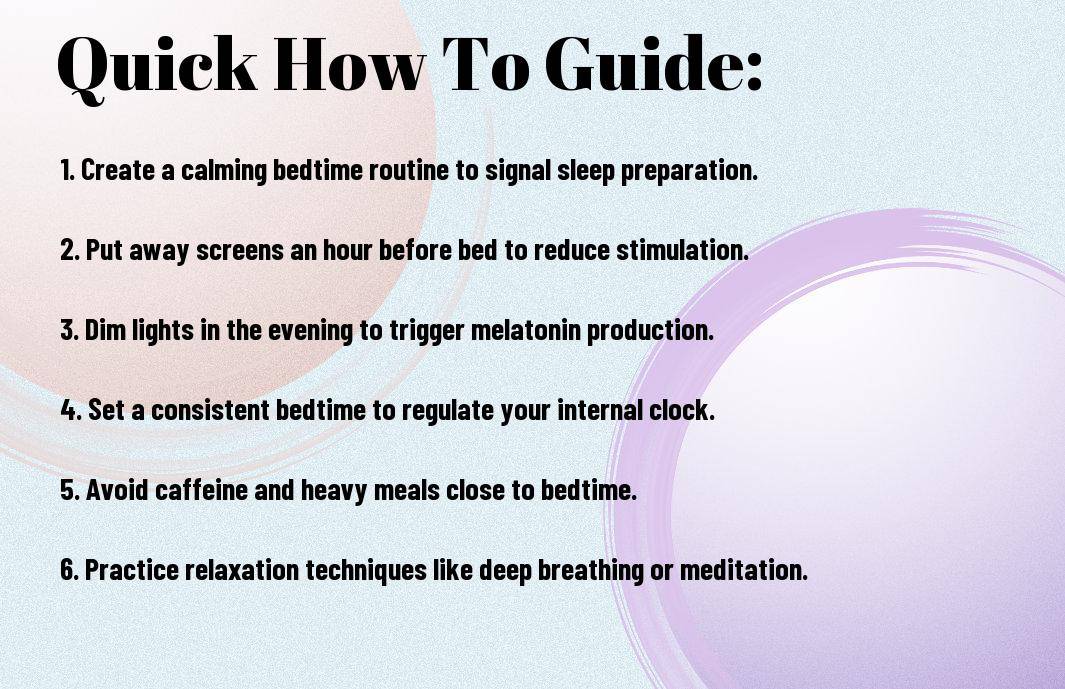Habits are a powerful force in our daily lives, affecting everything from our productivity to our health. Concerning sleep improvement, establishing a nighttime routine can make all the difference. In this blog post, we will explore the concept of Atomic Habits and how you can apply them to your nightly rituals to improve the quality of your sleep.
Key Takeaways:
- Consistency: Creating a consistent nighttime routine can signal to your body that it’s time to wind down and prepare for sleep.
- Limit Screen Time: Avoid screens (phones, computers, TVs) at least an hour before bed as the blue light can disrupt your body’s natural sleep-wake cycle.
- Relaxation Techniques: Incorporate relaxation techniques like deep breathing, meditation, or gentle stretches to calm your mind and body before sleep.
- Create a Comfortable Environment: Ensure your bedroom is conducive to sleep by keeping it dark, cool, and quiet.
- Avoid Stimulants: Limit consumption of caffeine, nicotine, and heavy meals close to bedtime as they can interfere with your ability to fall asleep.
- Establish a Wind-Down Routine: Engage in activities that help you unwind such as reading a book, taking a warm bath, or listening to calming music before bed.
- Consistent Sleep Schedule: Try to go to bed and wake up at the same time every day to regulate your body’s internal clock and improve sleep quality.


The Fundamentals of Atomic Habits
One of the best ways to improve your sleep quality is by establishing a solid nighttime routine. This routine can help set the tone for a restful night’s sleep and improve your overall well-being. If you’re looking to boost your productivity and sleep better, check out 7 Evening Routine Hacks To Help You Be Incredibly Productive for some great tips.
What Are Atomic Habits?
Some people may wonder what exactly constitutes an “atomic habit.” In simple terms, atomic habits are small, incremental changes that you make in your daily routine to achieve larger goals. By focusing on making tiny adjustments to your behavior, you can create powerful habits that have a big impact over time. These habits are built on the idea that small changes, consistently applied, can lead to remarkable results.
The Science Behind Habit Formation and Sleep
Atomic habits are rooted in the science of habit formation and sleep. Habits are formed through a loop of cue, routine, and reward, which creates automatic behaviors. In the matter of sleep, establishing a consistent bedtime routine can signal to your body that it’s time to unwind and prepare for rest. By incorporating small but meaningful habits into your nightly routine, you can optimize your sleep quality and overall well-being.
Fundamentals: Understanding the concept of atomic habits and the science behind habit formation can be key to improving your sleep quality. By making small, consistent changes to your nighttime routine and focusing on positive habits, you can create a powerful foundation for better sleep and overall health.
Analyzing Your Current Sleep Patterns
Unlike other aspects of our daily routines, sleep patterns can be more elusive to track and understand. Analyzing your current sleep patterns is crucial in identifying areas for improvement and implementing strategies for better sleep hygiene.
How to Identify What’s Working and What’s Not
Assuming you are looking to enhance your nighttime routines, start by keeping a sleep journal. Note the time you go to bed, the time you wake up, and any factors that may have influenced your sleep quality. Look for patterns such as recurring late-night snacking, screen time before bed, or a restless mind that keeps you awake.
Tools and Tips for Tracking Your Sleep
Tips for tracking your sleep include using a sleep tracking app or wearable device, such as a fitness tracker or smartwatch. These tools can provide valuable insights into your sleep patterns, including duration, quality, and disruptions. Additionally, consider keeping a consistent bedtime and wake-up time to establish a regular sleep routine.
- Sleep journal: Keep track of your bedtime, wake-up time, and any factors affecting your sleep.
- Sleep tracking app: Use technology to monitor your sleep patterns and improve sleep quality.
- Consistent sleep schedule: Maintain a regular bedtime and wake-up time for optimal rest.
After implementing these tools and tips, you may start to notice patterns and make adjustments to improve your sleep quality and overall well-being.
The Four Laws of Atomic Habit Change for Sleep
Make It Obvious: Setting Up Sleep Cues
For better sleep habits, it’s crucial to make the process obvious by setting up clear sleep cues. If you want to improve your nighttime routine, try establishing a regular schedule by going to bed and waking up at the same time each day. This consistency helps train your body to recognize when it’s time to wind down and prepare for sleep.
Make It Attractive: Creating a Desirable Bedtime Routine
For a more attractive bedtime routine, incorporate activities that you find enjoyable and relaxing. Setting the stage for sleep with calming rituals such as reading a book, taking a warm bath, or listening to soft music can help signal to your body that it’s time to unwind and prepare for rest.
It is important to create a bedtime routine that you look forward to and that helps you relax. By incorporating activities that you enjoy and find rewarding, you can make the process of preparing for sleep more appealing and set the stage for a restful night.
The Four Laws of Atomic Habit Change for Sleep (continued)
Your 10 Ideas for Getting 1% Better Every Day With Atomic Habits can greatly enhance your nighttime routine. By incorporating these strategies into your habits, you can improve your sleep and overall well-being. Let’s explore deeper into how you can apply the remaining laws of atomic habit change to your sleep habits.
Make It Easy: Simplifying Your Nighttime Routine
Habit: One of the keys to improving your nighttime routine is to make it as easy as possible. Set out your pajamas, prepare your bedroom for sleep, and eliminate any distractions that may keep you awake. By simplifying your routine, you reduce the barriers to getting the rest you need.
Make It Satisfying: Rewarding Yourself for Good Sleep Habits
Satisfying: Rewarding yourself for good sleep habits can reinforce positive behavior and make it more likely that you will continue on your path to better sleep. Whether it’s treating yourself to a relaxing evening bath, reading a book in bed, or enjoying a warm cup of herbal tea before sleep, find ways to make your nighttime routine enjoyable and satisfying.
Make: Note, the key is to find rewards that are both pleasurable and healthy. This will create a positive association with your nighttime routine and help you stick to your sleep goals in the long run.
Tips for Building and Maintaining Consistent Sleep Routines
Despite the challenges that may come with establishing a consistent sleep routine, there are several tips that can help you stay on track and improve your sleep quality. By implementing these strategies, you can work towards better sleep habits and overall well-being.
- Set a consistent bedtime: Try to go to bed and wake up at the same time every day, even on weekends.
- Create a relaxing bedtime routine: Wind down before bed with calming activities such as reading or taking a warm bath.
- Avoid stimulants before bed: Limit your intake of caffeine and electronics before bedtime to improve your sleep quality.
Perceiving the importance of consistent sleep routines can lead to better overall health and well-being. If you want to learn more about how to improve your sleep habits, check out A Brief Guide on How to Sleep Better Every Night.
How to Stay on Track with Your Sleep Goals
Any journey towards improving your sleep habits requires dedication and consistency. Keep a sleep journal to track your progress and make adjustments as needed. Setting small, achievable goals can help you stay motivated and on track towards better sleep.
Overcoming Common Obstacles to Healthy Sleep Habits
Any disruption to your sleep routine can make it challenging to maintain healthy habits. Overcoming common obstacles such as stress, electronic devices, and irregular schedules is crucial for promoting better sleep hygiene. By establishing a relaxing bedtime routine and creating a conducive sleep environment, you can overcome these obstacles and improve your overall sleep quality.
Advanced Strategies for Sleep Improvement
Many individuals struggle with getting a good night’s sleep, but there are advanced strategies that can help improve sleep quality significantly. By fine-tuning your environment and leveraging technology, you can optimize your nighttime routine for better rest and rejuvenation.
- Fine-Tuning Your Environment for Optimal Sleep
Factor Impact Temperature Regulating the temperature in your bedroom can enhance sleep quality. Lighting Creating a dark environment signals the body that it’s time to sleep.
Sleep is influenced by various environmental factors, and making adjustments to your surroundings can make a big difference. Keeping your bedroom cool can help signal your body that it’s time to rest, promoting better sleep quality. Additionally, minimizing light exposure in the evening can support the natural production of melatonin, a hormone that regulates the sleep-wake cycle.
Leveraging Technology and Tools for Enhanced Sleep Quality
Many advanced technology tools are available to help improve sleep quality, such as sleep tracking devices, white noise machines, and smart lighting systems. These tools can provide valuable insights into your sleep patterns and help create a more conducive sleep environment for optimal rest.
Advanced technology offers a range of solutions for enhancing sleep quality. From monitoring your sleep patterns to setting up smart devices that create a sleep-friendly environment, leveraging technology can aid in improving the overall quality of your sleep. By incorporating these tools into your nightly routine, you can address any sleep issues and work towards a more restful night’s sleep.
Final Words
So, implementing effective nighttime routines can significantly improve the quality of your sleep. By incorporating Atomic Habits principles, such as making small changes, being consistent, and building habits over time, you can create a bedtime routine that helps you relax and unwind before going to bed. Recall, the key is to find what works best for you and stick with it to reap the benefits of improved sleep and overall well-being.
FAQ
Q: What is the importance of nighttime routines for sleep improvement?
A: Nighttime routines play a crucial role in preparing your body and mind for a good night’s sleep. They help signal to your brain that it’s time to wind down and relax.
Q: How can atomic habits help in improving nighttime routines?
A: Atomic habits involve making small, incremental changes to your behavior, which can lead to significant improvements over time. By developing positive habits around your nighttime routine, you can enhance your sleep quality.
Q: What are some examples of atomic habits for better sleep?
A: Examples of atomic habits for better sleep include setting a consistent bedtime, creating a relaxing pre-sleep routine, limiting screen time before bed, and creating a comfortable sleep environment.
Q: How can I establish a consistent bedtime as part of my nighttime routine?
A: To establish a consistent bedtime, try to go to bed and wake up at the same time every day, even on weekends. This helps regulate your body’s internal clock and improve the quality of your sleep.
Q: What are some tips for creating a relaxing pre-sleep routine?
A: To create a relaxing pre-sleep routine, consider activities such as reading a book, taking a warm bath, practicing deep breathing exercises, or listening to calming music. Avoid stimulating activities or screens that emit blue light.
Q: How does limiting screen time before bed contribute to better sleep?
A: Blue light emitted by screens can interfere with the production of the sleep hormone melatonin, making it harder to fall asleep. Limiting screen time before bed can help signal to your brain that it’s time to prepare for sleep.
Q: What are some ways to create a comfortable sleep environment for better sleep?
A: To create a comfortable sleep environment, make sure your bedroom is dark, quiet, and cool. Invest in a comfortable mattress and pillows, and consider using white noise machines or earplugs if needed.



